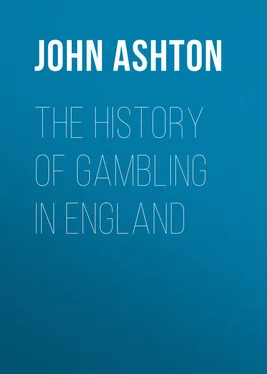John Ashton - The History of Gambling in England
Здесь есть возможность читать онлайн «John Ashton - The History of Gambling in England» — ознакомительный отрывок электронной книги совершенно бесплатно, а после прочтения отрывка купить полную версию. В некоторых случаях можно слушать аудио, скачать через торрент в формате fb2 и присутствует краткое содержание. Жанр: foreign_antique, foreign_prose, на английском языке. Описание произведения, (предисловие) а так же отзывы посетителей доступны на портале библиотеки ЛибКат.
- Название:The History of Gambling in England
- Автор:
- Жанр:
- Год:неизвестен
- ISBN:нет данных
- Рейтинг книги:5 / 5. Голосов: 1
-
Избранное:Добавить в избранное
- Отзывы:
-
Ваша оценка:
- 100
- 1
- 2
- 3
- 4
- 5
The History of Gambling in England: краткое содержание, описание и аннотация
Предлагаем к чтению аннотацию, описание, краткое содержание или предисловие (зависит от того, что написал сам автор книги «The History of Gambling in England»). Если вы не нашли необходимую информацию о книге — напишите в комментариях, мы постараемся отыскать её.
The History of Gambling in England — читать онлайн ознакомительный отрывок
Ниже представлен текст книги, разбитый по страницам. Система сохранения места последней прочитанной страницы, позволяет с удобством читать онлайн бесплатно книгу «The History of Gambling in England», без необходимости каждый раз заново искать на чём Вы остановились. Поставьте закладку, и сможете в любой момент перейти на страницу, на которой закончили чтение.
Интервал:
Закладка:
Professor. It is not good to be too just, or too wise (Eccl. vii. 18).
Preacher. It is not good to be too wise, or too foolish, in despising the word of God (Prov. i. 22) and not regarding the weaknesse of other (Rom. xiv. 21). Let us therefore beware that we love not pleasure more than godlinesse (2 Tim. iii. 4).”
The following broadside, which was bought in the streets, about 1850, is a copy of one which appeared in the newspapers about the year 1744, when it was entitled “Cards Spiritualized.” The name of the soldier is there stated to be one Richard Middleton, who attended divine service, at a church in Glasgow, with the rest of the regiment.
giving an Account of Richard Lane, a Private belonging to the 47th Regiment of Foot, who was taken before the Mayor of the Town for Playing at Cards during Divine Service.
The Sergeant commanded the Soldiers at Church, and when the Parson had read the prayers, he took his text. Those who had a Bible, took it out, but the Soldier had neither Bible nor Common Prayer Book, but, pulling out a Pack of Cards he spread them before him. He, first, looked at one card, and then at another: the Sergeant of the Company saw him, and said, ‘Richard, put up the Cards, this is not the place for them.’ ‘Never mind that,’ said Richard. When the service was over, the Constable took Richard prisoner, and brought him before the Mayor. ‘Well,’ says the Mayor, ‘what have you brought that Soldier here for?’ ‘For playing Cards in church.’ ‘Well, Soldier, what have you to say for yourself?’ ‘Much, I hope, Sir.’ ‘Very good; if not, I will punish you more than ever man was punished.’ ‘I have been,’ said the Soldier, ‘about six weeks on the march. I have had but little to subsist on. I have neither Bible, nor Prayer Book – I have nothing but a Pack of Cards, and I hope to satisfy your Worship of the purity of my intentions.’ ‘Very good,’ said the Mayor. Then, spreading the cards before the Mayor, he began with the Ace.
‘When I see the Ace, it reminds me that there is only one God.
When I see the Deuce, it reminds me of the Father and the Son.
When I see the Tray, it reminds me of Father, Son and Holy Ghost.
When I see the Four, it reminds me of the four Evangelists that preached, viz., Matthew, Mark, Luke and John.
When I see the Five, it reminds me of the Five Wise Virgins that trimmed their lamps. There were ten, but five were wise, and five foolish, who were shut out.
When I see the Six, it reminds me that in Six days the Lord made Heaven and Earth.
When I see the Seven, it reminds me that on the seventh day God rested from the works which he had made, and hallowed it.
When I see the Eight, it reminds me of the eight righteous persons that were saved when God drowned the world, viz., Noah and his wife, his three sons and their wives.
When I see the Nine, it reminds me of the nine lepers that were cleansed by our Saviour. There were ten, but nine never returned God thanks.
When I see the Ten, it reminds me of the Ten Commandments, which God handed down to Moses, on a table of stone.
When I see the King, it reminds me of the Great King of Heaven, which is God Almighty.
When I see the Queen, it reminds me of the Queen of Sheba, who went to hear the wisdom of Solomon; for she was as wise a woman as he was a man. She brought with her fifty boys and fifty girls, all dressed in boy’s apparel for King Solomon to tell which were boys, and which were girls. King Solomon sent for water for them to wash themselves; the girls washed to the elbows, and the boys only to the wrist, so King Solomon told by that.’
‘Well,’ said the Mayor, ‘you have given a description of all the Cards in the pack, except one.’ ‘Which is that?’ said the Soldier. ‘The Knave,’ said the Mayor. ‘I will give your honour a description of that, too, if you will not be angry.’ ‘I will not,’ said the Mayor, ‘if you will not term me to be the Knave.’ ‘Well,’ said the Soldier, ‘the greatest knave I know, is the constable that brought me here.’ ‘I do not know,’ said the Mayor, ‘whether he is the greatest knave, but I know he is the greatest fool.’
‘When I count how many spots there are in a pack of cards, I find 365, as many days as there are in a year. 14 14 I fail to see how this is made out. – J. A.
When I count the number of cards in a pack, I find there are 52, as many weeks as there are in a year.
When I count the tricks at Cards, I find 13, as many months as there are in a year. So you see, Sir, the Pack of Cards serves for a Bible, Almanack, and Common Prayer Book to me.’
The Mayor called for some bread and beef for the Soldier, gave him some money, and told him to go about his business, saying that he was the cleverest man he ever heard in his life.”
The origin of Playing Cards is involved in mystery, although the Chinese claim to have invented them, saying that the Tien-Tsze, pae, or dotted cards, now in use, were invented in the reign of Leun-ho, a. d. 1120, for the amusement of his wives; and that they were in common use in the reign of Kaow-Tsung, who ascended the throne a. d. 1131. The generally received opinion is that they are of Oriental extraction, and that they were brought into Europe by the gipsies, and were first used in Spain. How, or when they were introduced into England, is not known. In Anstis’s History of the Order of the Garter , vol. i., p. 307, is to be found the earliest mention of Cards, if, indeed, the Four Kings there mentioned are connected with Cards. The date would be 1278.
“This Enquiry touching the Title of Kings, calls to remembrance the Plays forbidden the Clergy, denominated Ludos de Rege et Regina , which might be Cards , Chesse , or the Game since used even to this Age at Christmas , called Questions and Commands , and also that Edward I. plaid ad quatuor Reges (Wardrobe Rolls, 6 Ed. I, Waltero Storton ad opus Regis ad ludendum ad Quatuor Reges viii. s. v. d.) which the Collector guesses might be the Game of Cards, wherein are Kings of the four Suits; for he conceives this Play of some Antiquity, because the term Knave , representing a Youth, is given to the next Card in Consequence to the King and Queen, and is as it were the Son of them, for, in this Sense this Word, Knave, was heretofore used; thus Chaucer saith, That Alla , King of Northumberland begot a Knave Child.”
The Hon. Daines Barrington, in a paper read by him to the Society of Antiquaries, Feb. 23, 1786, after quoting Anstis, went on to say that “Edward the First (when Prince of Wales) served nearly five years in Syria, and, therefore, whilst military operations were suspended, must, naturally, have wished for some sedentary amusements. Now the Asiatics scarcely ever change their customs; and, as they play at Cards (though, in many respects, different from ours), it is not improbable that Edward might have been taught the game, ad quatuor reges , whilst he continued so long in this part of the globe.
“If, however, this article in the Wardrobe account is not allowed to allude to playing cards , the next writer who mentions the more early introduction of them is P. Menestrier, who, from such another article in the Privy purse expences of the Kings of France, says they were provided for Charles VI. by his limner, after that King was deprived of his senses in 1392. The entry is the following: ‘Donné a Jacquemin Gringonneur, Peintre, pour trois jeux de Cartes, a or et a diverses couleurs, de plusieurs devises, pour porter vers le dit Seigneur Roi pour son abatement, cinquante six sols Parisis.’”
Читать дальшеИнтервал:
Закладка:
Похожие книги на «The History of Gambling in England»
Представляем Вашему вниманию похожие книги на «The History of Gambling in England» списком для выбора. Мы отобрали схожую по названию и смыслу литературу в надежде предоставить читателям больше вариантов отыскать новые, интересные, ещё непрочитанные произведения.
Обсуждение, отзывы о книге «The History of Gambling in England» и просто собственные мнения читателей. Оставьте ваши комментарии, напишите, что Вы думаете о произведении, его смысле или главных героях. Укажите что конкретно понравилось, а что нет, и почему Вы так считаете.












